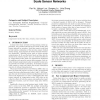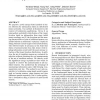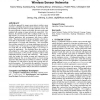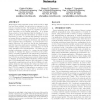120
click to vote
SENSYS
2003
ACM
15 years 7 months ago
2003
ACM
Wireless sensor networks promise fine-grain monitoring in a wide variety of environments. Many of these environments (e.g., indoor environments or habitats) can be harsh for wire...
SENSYS
2003
ACM
15 years 7 months ago
2003
ACM
112
Voted
SENSYS
2003
ACM
15 years 7 months ago
2003
ACM
For many sensor network applications such as military surveillance, it is necessary to provide full sensing coverage to a security-sensitive area while at the same time minimizing...
126
click to vote
SENSYS
2003
ACM
15 years 7 months ago
2003
ACM
The dynamic and lossy nature of wireless communication poses major challenges to reliable, self-organizing multihop networks. These non-ideal characteristics are more problematic ...
SENSYS
2003
ACM
15 years 7 months ago
2003
ACM
127
click to vote
SENSYS
2003
ACM
15 years 7 months ago
2003
ACM
An effective approach for energy conservation in wireless sensor networks is scheduling sleep intervals for extraneous nodes, while the remaining nodes stay active to provide cont...
125
click to vote
SENSYS
2003
ACM
15 years 7 months ago
2003
ACM
Event-driven sensor networks operate under an idle or light load and then suddenly become active in response to a detected or monitored event. The transport of event impulses is l...
130
click to vote
SENSYS
2003
ACM
15 years 7 months ago
2003
ACM
Sensor networks not only have the potential to change the way we use, interact with, and view computers, but also the way we use, interact with, and view the world around us. In o...
135
click to vote
SENSYS
2003
ACM
15 years 7 months ago
2003
ACM
The current generation of sensor nodes rely on commodity components. The choice of the radio is particularly important as it impacts not only energy consumption but also software ...
SENSYS
2003
ACM
15 years 7 months ago
2003
ACM





